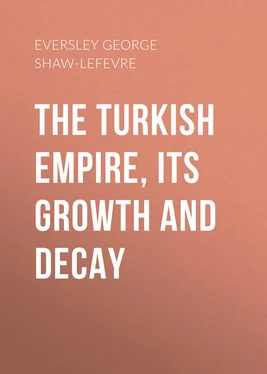George Eversley - The Turkish Empire, its Growth and Decay
Здесь есть возможность читать онлайн «George Eversley - The Turkish Empire, its Growth and Decay» — ознакомительный отрывок электронной книги совершенно бесплатно, а после прочтения отрывка купить полную версию. В некоторых случаях можно слушать аудио, скачать через торрент в формате fb2 и присутствует краткое содержание. Жанр: foreign_antique, foreign_prose, на английском языке. Описание произведения, (предисловие) а так же отзывы посетителей доступны на портале библиотеки ЛибКат.
- Название:The Turkish Empire, its Growth and Decay
- Автор:
- Жанр:
- Год:неизвестен
- ISBN:нет данных
- Рейтинг книги:3 / 5. Голосов: 1
-
Избранное:Добавить в избранное
- Отзывы:
-
Ваша оценка:
- 60
- 1
- 2
- 3
- 4
- 5
The Turkish Empire, its Growth and Decay: краткое содержание, описание и аннотация
Предлагаем к чтению аннотацию, описание, краткое содержание или предисловие (зависит от того, что написал сам автор книги «The Turkish Empire, its Growth and Decay»). Если вы не нашли необходимую информацию о книге — напишите в комментариях, мы постараемся отыскать её.
The Turkish Empire, its Growth and Decay — читать онлайн ознакомительный отрывок
Ниже представлен текст книги, разбитый по страницам. Система сохранения места последней прочитанной страницы, позволяет с удобством читать онлайн бесплатно книгу «The Turkish Empire, its Growth and Decay», без необходимости каждый раз заново искать на чём Вы остановились. Поставьте закладку, и сможете в любой момент перейти на страницу, на которой закончили чтение.
Интервал:
Закладка:
The immediate objects of Orchan’s ambition, on his accession, were the Greek cities of Nicæa and Nicomedia, with their surrounding districts, the last important possessions of the Byzantine Empire in Asia. Nicæa was then a great city. It had attained greater importance during the sixty years when the Latins were in occupation of Constantinople and the Greek Emperors were relegated to Asia and made it their capital. It was well fortified. It could only be captured, as Brusa had been, by cutting off its communications with Constantinople, and depriving its people of the means of subsistence. The Greek Emperor, Andronicus III, made an effort to relieve it. He hastily raised an army of mercenaries, in 1326, and led them across the Bosphorus. He fought a battle against Orchan at Pelecanon, on the north shore of the Gulf of Nicomedia. According to the Greek historians, the Ottomans had much the worst of it, losing a great number of men, while the losses of the Greeks were trivial. However that may have been, Andronicus decided on a retreat. But a scrimmage occurred in the night between his bodyguard and the enemy, in which the Emperor himself was slightly wounded. He thereupon fled precipitately, and was conveyed in a litter to the Bosphorus and thence to Constantinople. His army, dispirited by this abandonment by their Emperor, was defeated and dispersed. As a result, Nicæa surrendered in the following year, 1327, on favourable terms. The majority of its garrison and citizens followed the example of those of Brusa and adopted Islam. Very few availed themselves of the offer to transfer themselves to Europe. This ill-starred campaign and cowardly flight of Andronicus was the last effort of the Byzantine Emperors to save their possessions in Asia. What remained of them, chiefly the city of Nicomedia, were left to their own resources, without further aid from Europe. Nicomedia was well fortified and was apparently a tough job for the Ottomans, for it held out till 1337, or possibly 1338, and eventually surrendered in the same way, and on the same terms, as Brusa and Nicæa.
In the interval of ten years between the capture of Nicæa and Nicomedia, Orchan was further engaged in extending his State elsewhere in Asia, not towards Angora, in the south, as stated by some historians, but to the north-west, in the ancient Mysia, by the conquest of the Emirate of Karasi, which lay immediately to the north of Sarukhan and with a frontage to the sea opposite to the island of Mytilene. The Emir of this State died in 1333. His two sons disputed the succession. The younger one was favoured by the Ottomans, and when he was put to death by his brother, Orchan sent an army ostensibly to avenge him. The Emir was driven into exile and his State was promptly annexed by Orchan. The same fate befell some other petty Emirates on the southern borders of the Marmora and the Hellespont, rounding off the boundary of the Ottoman State in the north-west corner of Anatolia. The population of Karasi and the smaller States was mainly Turkish, but there must have been many Greeks on the coast who probably adopted Islam, as had the majority of the Greeks of Brusa and Nicæa. After these acquisitions, and that of Nicomedia in 1338, there were no further additions to the Ottoman State in Asia Minor during Orchan’s reign.
There followed, after the capture of Nicomedia, a few years of peace, and it may well be that, during this time, Orchan completed the scheme for the organization of his State and his army. Hitherto, when Othman and Orchan were involved in disputes with their neighbours, and it was necessary to use armed force in resistance or attack, an appeal was made for the voluntary service of all the male members of their petty State or clan capable of bearing arms; and the appeal was responded to without question. When the occasion for their service was at an end, the warriors returned to their homes and to their usual vocations. With a rapidly expanding territory and with great ambitions for further conquests, it was evidently thought necessary to constitute a permanent and well-disciplined force, and Orchan, whether adopting, or not, the plans of his brother Alaeddin, determined to effect this. On the one hand, he enrolled a considerable body of infantry for continuous service. They were subject to strict discipline and were well paid, and it will be seen that they could be sent beyond the realm to assist the Greek Emperor or otherwise. 4 4 This was not the corps of Janissaries, which, as Mr. Gibbons has shown, was created not by Orchan but by his son Murad.
On the other hand, a large body of horsemen was provided, not under continuous service, but under obligatory service, when occasion arose for calling them out.
For this purpose the country districts were divided into fiefs, the holders of which were bound to serve in the event of war, and to come provided with horses and equipment, or to find substitutes in proportion to the extent of their fiefs. It was, in fact, the adoption of the feudal system, then almost universal in Europe, with this marked difference, that the fiefs were small in extent and were not, as a rule, hereditary. They were given for life as rewards for military service, and on the death of their holders were granted to other soldiers, though in some cases hereditary claims were recognized. When new territories were acquired by conquest from non-Moslems, large parts of them were divided into new fiefs, and were granted to the soldiers who had distinguished themselves in the war. Military service, whether in the new infantry or in the feudal cavalry, was strictly confined to Moslems. Christians, who were thus exempted from military duty, were subjected to a heavy capitation tax from which Moslems were free.
This new organization of the army, commenced by Orchan and extended and perfected by his son Murad, who also, it will be seen, created the famous corps of Janissaries, converted the nascent Ottoman State into a most powerful engine for war, and gave an immense impetus to the conquest of non-Moslem countries. Most splendid rewards were held out to the Moslem soldiers for victory and bravery. In the event of victory they benefited not only from the ordinary booty in money and chattels, on the sack of cities and the pillage of country districts. They also received as their share four-fifths of the proceeds of the sale of captives as slaves, the other fifth being reserved as the share of the Sultan. The captives were not only the enemies’ soldiers taken in battle, but in many cases the inhabitants of the conquered districts. The strong and the young of both sexes were carried off and were sold, the men as slaves, the fairer women for wives or concubines, or for harems. The soldiers further received, as has been shown above, a large share of the confiscated lands to be held as military fiefs in reward for bravery in battle. As these fiefs were granted for life only, there was a further distribution among the soldiers of the fiefs held by their comrades who were killed in battle, and often, it is said, the same fiefs changed hands many times in the course of a campaign.
The Moslem inhabitants of a conquered territory were not sold off as slaves, nor were their lands confiscated. These measures were reserved for Christians or non-Moslems. In some cases the Christians were given the option of embracing Islam in order to avoid slavery and the confiscation of their land. But these exceptions were rare in the conquests in Europe, and it is obvious that, to whatever extent they took place, the rewards obtained by the soldiers were reduced.
It has been shown that hitherto in the Ottoman conquests in Asia Minor at the expense of the Byzantine Empire a great proportion of the Christian population embraced Islam; and it may well have been that the spread of Islam and the conversion of infidels to the true faith were in part the incentives for the expansion of the Ottoman Empire. But henceforth, after the organization of the army by Orchan and Murad and the great rewards held out to the soldiers for the conquest of non-Moslem territories, it does not appear that the Ottoman armies were inspired by any missionary zeal for the spread of Islam. The main, if not the sole motives, were loot and plunder, the sale of captives as slaves, and the confiscation of land and its distribution among the soldiers as fiefs; and these objects were attained to a far greater extent by the invasion of Christian States in Europe than by the extension of the Empire over Moslem countries in Asia.
Читать дальшеИнтервал:
Закладка:
Похожие книги на «The Turkish Empire, its Growth and Decay»
Представляем Вашему вниманию похожие книги на «The Turkish Empire, its Growth and Decay» списком для выбора. Мы отобрали схожую по названию и смыслу литературу в надежде предоставить читателям больше вариантов отыскать новые, интересные, ещё непрочитанные произведения.
Обсуждение, отзывы о книге «The Turkish Empire, its Growth and Decay» и просто собственные мнения читателей. Оставьте ваши комментарии, напишите, что Вы думаете о произведении, его смысле или главных героях. Укажите что конкретно понравилось, а что нет, и почему Вы так считаете.












